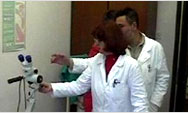You are here » Home » Telling Our Story
Photo & Caption
Providing Better Access to Health Care

| |
Photo: Anonymous
|
|
Children line up at a mobile medical unit, where they will later receive vaccinations. The program began in January 2006, and within several months had reached more than 9,500 people.
|
For many Iraqis, regular access to health care is rare. Doctors are overworked and health facilities are often crowded and under-staffed. In many areas where fighting has taken place, public health centers are closed for security reasons or have been destroyed in the conflict. That is why in January 2006, USAID worked with Iraqi health officials to launch a fleet of mobile medical units to areas where people have little or no access to health care.
Working with one of its partners, USAID provided basic training to medical staff and obtained enough medication to treat 25,000 people. After the medical units were stocked, they were dispatched to different areas in the country. One unit operates in a major urban area in Al Anbar, while the other four provide treatment in villages that have been impacted by the conflict. In all five areas, health care services other than those provided by the medical units are practically non-existent.
Within several months, these five units screened more than 9,500 people, provided medication or treatment to 3,800 patients, and vaccinated 950 women and 1,640 children under the age of five. In addition to dispensing treatment and care, the units also helped educate the populations about good hygiene practices and staying healthy. By providing mobile medical units, USAID is working hard to improve the quality of life of Iraqis.
Print-friendly version of this page (428kb - PDF)
Click here for high-res photo
Back to Top ^ | 

